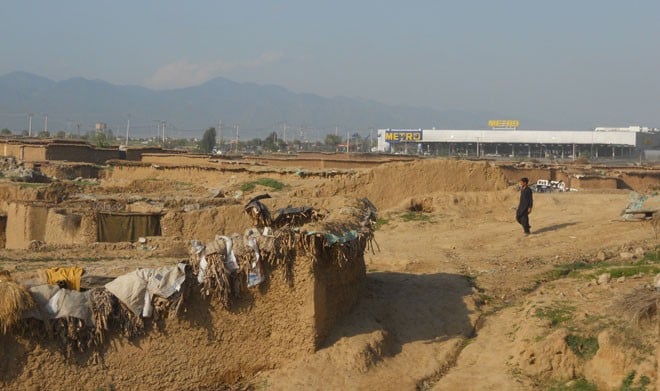

Afghan Basti, an ‘illegal’ slum in sector I-11, is named after the Afghan refugees who started settling there in 1979 during and after the Afghan war.
Driving into the Basti is like making a journey from modernisation to the Stone Age -- from clean and wide roads to congested, uneven, dark and dusty alleys.
The residents live in small homes, mostly built with mud and bricks. They are mostly Afghan refugees and migrants with some internally displaced population.
A majority of male members of the katchi abadi work as labourers in fruit and vegetable markets of Islamabad, which is situated on the other side of the road. Female members usually stay at home.
This settlement, along with several others in Islamabad, has come under renewed scrutiny since the attack on a judicial complex in Islamabad on March 3 and later a bomb blast that hit the fruit and vegetable market on April 9, 2014.
Police believe the Afghan katchi abadi is the most problematic settlement. Thus, it is the primary target of the eviction drive. The Capital Development Authority (CDA) sees this as a safe haven for kidnappers, terrorists and other criminals. "They are a major law and order problem in Islamabad," says a senior police official who does not want to be named.
In March, the CDA had issued notices to dwellers of these slums. Demolition of houses in these settlements was supposed to begin on March 24, 2014, but it was postponed after thousands of residents of these settlements held a sit-in in front of CDA offices on March 20. Their fate still hangs in the balance.
"They might come again to our homes," fears Chand Bibi, 40, who runs a non-profit school in the basti. "On Monday, they razed several houses in our basti."
Hailing from Mingora, Swat, she moved to Islamabad in 2008 before the military operation started against Taliban in her area. "I live in Rawalpindi with my brother but come here to teach kids and women in this settlement. There are no schools, clean drinking water, electricity, or hospitals here. The people live here because they cannot afford rented houses," she says. "About 90 percent of over 1200 families living here are Pakistanis. They are from different parts of tribal areas and KP province."
Members of the locality resist the idea of relocation. "We have the fruit and vegetable market nearby where we can work and earn some money for our kids," says Lal Badshah, 62, sitting on a rickety charpoy.
A father of 11 children, he works as labourer in the fruit and vegetable market with his eight sons. Lal came to this place some twenty years ago from Mardan district of KP. "I was young at that time and wanted to change the fate of my poor family. I worked hard but twenty years down the road, I still have nothing to boast about. They are going to snatch our shelter as well."
Lal is determined not to leave the place: "I would set up a tent here if they raze my mud-house."
He believes the writ of the state is directed only against the poor in this country, "when PML-N was in opposition its leaders used to come to us and promise that no authority could evict us. We voted for PML-N in the last elections as they promised to legalise this settlement but now we are being termed as terrorists."
There are some 24 slums in Islamabad and the interior ministry has decided to remove at least 12 of them, which, according to them, are the most problematic. According to the interior ministry officials, there are over 98,000 people living in the illegal slums in Islamabad.
CDA officials reckon the case of Afghan Basti is different. The land has already been allocated to people many years ago. "There are 850 residential plots in I-11. Out of these, 487 plots are illegally occupied," says a senior official of CDA.
According to a CDA survey of the Afghan Basti conducted in November 2012 with the help of UNHCR, there were 864 families comprising 7995 individuals living there. "47 families were of Punjab origin, 114 registered Afghan families, comprising 1022 individuals, 27 non-registered Afghan families, 324 families are of Mohmand and Bajaur Agencies’ origin, while 3105 individuals making up 352 families are from different cities of KP," reads the survey.
The young people in the basti are angry over the government’s decision to pull them out. "I was born here 18 years ago. All my brothers and sisters were born here. Now, they say it is an illegal settlement and a majority of people living here are terrorists and criminals. Terrorists do not beg, they do not arrange a sit in, you know what they do," says Sardar Khan, who is a labourer since the age of eight. His father moved to the area 30 years ago from Mohmand Agency.
"If there are any criminals in our basti, they should be arrested. Razing the whole settlement is not the right thing to go about it. This may result in producing terrorists," he says.
Residents of the basti have witnessed police raids for years. "Police raid our houses regularly; they come early in morning and enter our houses without permission. They can arrest anybody. The CDA officials also demand bribes from our people."
"The land in Afghan Basti was allotted to people who paid for it years ago, but a big part of it has been encroached upon now," says Asim Kichi, spokesperson CDA. "We have proofs that a majority of those living in Afghan Basti have homes in other cities of the country. Also, a majority of Afghan refugees returned to their country in 2005-06 and the area was vacated but many from tribal areas and districts of KP started living here. CDA cannot provide them an alternative place to live," he says.